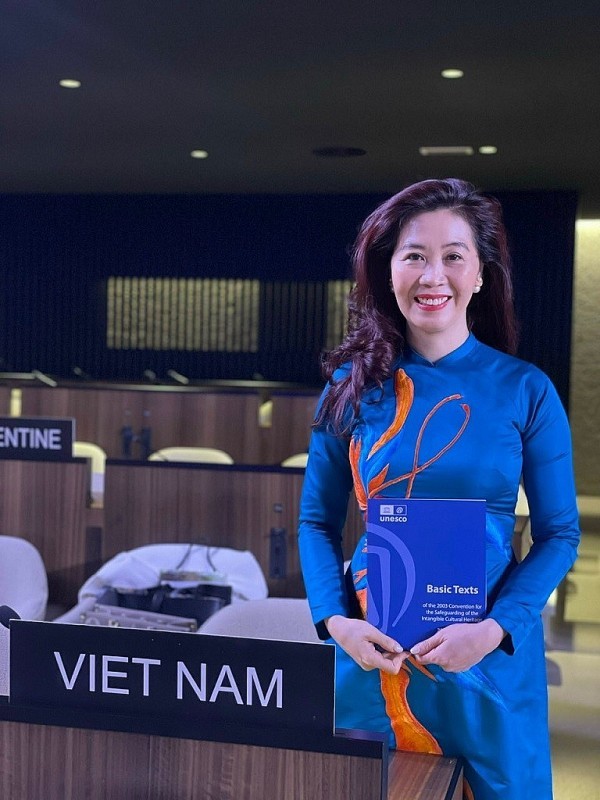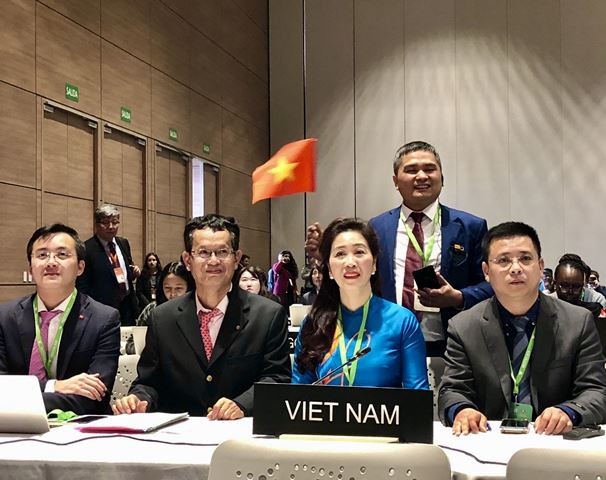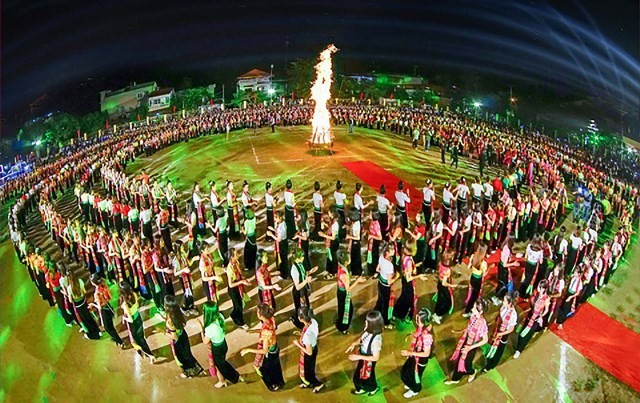
Member of Intergov'l Committee of Convention 2003: Much to do in assuming new role at UNESCO
Latest
Dr. Hien cited a number of significant factors behind Vietnam’s election as a member of the Intergovernmental Committee of the Convention for the Safeguarding of Intangible Cultural Heritage of UNESCO (the Convention 2003) for the 2022-2026 term, with 120 votes, the highest among the elected countries, during the ninth session of the General Assembly of the States Parties to the Convention 2003.
 |
| Assoc.Prof.Dr. Le Thi Thu Hien, Director-General of the Cultural Heritage Department, under the Ministry of Culture, Sports and Tourism, permanent member of the National Council of Cultural Heritage. (Photo: WVR) |
First of all, this re-election reaffirms Vietnam's commitment to be an active and responsible member of UNESCO as well as the Convention 2003, its strong resilience in contributing to the safeguarding of cultural diversity and sustainable development of the world's intangible cultural heritage.
After its first term 12 years ago, Vietnam’s re-election to the Intergovernmental Committee for the term 2022-2026 with the highest vote of confidence is a strong demonstration of the support and recognition of 180 countries around the world for Vietnam's constant efforts, experience and practical contributions to the preservation of intangible cultural heritage of UNESCO, Dr. Hien said.
"This reflects the efforts and effective coordination among the relevant agencies of the Ministry of Culture, Sports and Tourism and the Ministry of Foreign Affairs, the Permanent Delegation of Vietnam to UNESCO, and the support of international friends.
But above all, this success belongs to the community of artisans, who have preserved intangible cultural heritages for many years,", she said.
Being one of 24 members of the Intergovernmental Committee of the Convention 2003 for the 2022-2026 term is an honor and pride.
Vietnam will have favorable conditions to further contribute to implementation of the objectives and priorities of the Convention 2003, raising the importance of intangible cultural heritage, affirming the role and prestige of Vietnam at UNESCO in particular and enhancing Vietnam's reputation in the international cultural arena in general.
This is a practical achievement contributing to the successful implementation of the Resolution of the 13th National Congress and the Strategy for Cultural Development toward 2030 while, at the same time, helping to ensure the principles of equity among States Members and mutual respect for all communities in the world.
Regarding Vietnam’s contributions, Dr. Hien reviewed some specific outcomes, such as the following:
Adhere to the provisions of the Convention 2003 on the Safeguarding of Intangible Cultural Heritage, Vietnam has enacted a number of enhancing legal documents, such as Law on Cultural Heritage, two Decrees on awarding the title of Artist (Decree No. 62/2014/ND-CP) and supporting policies for artisans (Decree 109/2015/CP-CP), one Circular regulating the identification and preparation of heritage documents for inclusion in the List items of national intangible cultural heritage (Circular No. 04/2010/TT-BVHTTDL).
 |
| The Vietnamese delegation at the meeting of the Intergovernmental Committee of the Convention 2003 announced the inscription of the Then Practice Heritage of the Tay, Nung, and Thai people in Vietnam on the Representative List of Intangible Cultural Heritage of Humanity in 2019. |
To draw the attention and participation of the community in identifying various elements of intangible cultural heritage in the spirit of the Convention 2003, there are nearly 70,000 national intangible cultural heritages that have been identified. Currently, there are 431 intangible cultural heritages included in the National List and 14 heritages are inscribed on the UNESCO Representative Lists.
Maintaining relationships in the field of intangible cultural heritage with UNESCO States Members to the Convention 2003, exchange and share experiences related to good practice, transmission, documentation, protection measures; implementation of projects to safeguard intangible cultural heritage from funding sources of UNESCO or through UNESCO; organize training courses for staff on cultural heritage on community-based inventories of intangible cultural heritage across the country with the funding from UNESCO; cooperation with UNESCO Asia-Pacific 2nd class centers (3 centers located in Korea, Japan and China) in the safeguarding of intangible cultural heritage.
Vietnam also has many proactive contributions to the mission of the Intergovernmental Committee in preserving and promoting heritage values.
Vietnamese experts have been invited by UNESCO to join the Intangible Cultural Heritage Appraisal Authority to evaluate the heritage profiles to include in the UNESCO Representative List for the 2017 - 2020 term.
There is one NGO recognized by UNESCO, the Center for Cultural Research, Support and Development, which actively supports the Committee on professional work.
Vietnam was the first country to make a proposal, which resulted in the Intergovernmental Committee’s decision to remove one heritage, the Xoan singing, from the List of Intangible Cultural Heritage in Need of Urgent Safeguarding and transfer to the Representative List of Intangible Cultural Heritage of Humanity.
All the submitted profiles are agreed upon to be included in the Lists of good quality by UNESCO, recognized at the meetings of the Intergovernmental Committee as typical cases, and clearly stated in the decision to register the heritage.
The States Parties to the Convention 2003 highly appreciate many efforts of Vietnam in safeguarding intangible cultural heritage, making an important contribution to human cultural diversity. Vietnam's experience and expertise in the protection of intangible cultural heritage in theoretical, legal and practical aspects is expected to be good practice for many countries in the region and the world to protect the intangible cultural heritage in the country as well as in humanity.
In suggestion of what should have been done next to effectively assume Vietnam’s new role, Dr. Hien stressed that the Vietnamese Government highly appreciated and attached great importance to UNESCO's role in the protection of cultural heritage in general, and intangible cultural heritage in particular, for the development of the nation and humanity.
"Vietnam has shared its experience as well as demonstrated efforts to protect the intangible cultural heritage of humanity", she said.
In this second election, Vietnam’s candidacy was presented with the theme "Intangible cultural heritage for the resilience and sustainable development" and commitments to promote the objectives of the Convention 2003, international cooperation and assistance in protection of intangible cultural heritage; continue to be a responsible and active member in advancing the implementation of the Convention; fully implement the principles and provisions in the Guidelines for the implementation of the Convention; strengthen coordination with UNESCO and its agencies/organizations as well as States Parties in promoting the implementation of the Convention, the protection of intangible cultural heritage; enhancing training and capacity building, expertise of experts in the field of heritage through activities such as hosting conferences, seminars, training courses of UNESCO.
 |
| Member of Intergovernmental Committee of Convention 2003: Much to do in assuming a new role at UNESCO. (Photo: WVR/Le Hai Yen) |
Vietnam is also committed to hosting the Conference to celebrate the 20th anniversary of the Convention 2003 on the Safeguarding of Intangible Cultural Heritage; strengthening coordination with UNESCO, UNESCO organizations and States Parties in promoting the implementation of the Convention; exchange experiences, supporting member countries, especially countries in Southeast Asia and developing countries in the management and protection of intangible cultural heritage. To communicate, raise awareness and encourage the contribution of relevant agencies, localities and communities to join hands in the protection of intangible cultural heritage in accordance with the Convention.
In addition, Vietnam will share experiences in protecting intangible cultural heritage; further promote tolerance, respect and solidarity, strengthen UNESCO's priorities on Africa and gender equality, protect the rights of minorities and their cultures, promote sustainable development in the world; accelerate the implementation of UNESCO's global strategy in Vietnam and its member states in the field of intangible cultural heritage.
Regaring the focus of the work safeguarding heritages on the List of Intangible Cultural Heritage in Need of Urgent Protection, Dr. Hien said that the experience of preserving and promoting the values of intangible cultural heritage in Vietnam, which has been reflected in many aspects of the policies of the Party and received consensus of the community and the whole society in the past decades, will be promoted.
The Convention 2003 stipulates many important contents such as: identification of intangible cultural heritage, classification of intangible cultural heritage, the role and participation of communities and countries involved in the protection of intangible cultural heritage, etc.
One of the important tasks of protecting and promoting the values of intangible cultural heritage, in particular and cultural heritage in general in Vietnam, is to make cultural heritage become a positive contribution to cultural, economic and social life, contributing to the development of the country.
The Inclusion on the UNESCO Representative Lists as well as the National List of intangible cultural heritage is one among many activities to protect and promote the values of intangible cultural heritage. After the inclusion, further measures to protect and promote values are required.
In the coming time, the Ministry of Culture, Sports and Tourism will submit to relevant authorities for promulgating regulations on the protection and promotion of the values of intangible cultural heritage after inclusion. The authorities and communities of heritage at all levels need to take more responsibility in protecting and promoting the values of the heritage that has been inscribed on the UNESCO Lists as well as the National Lists.
Regarding specific plans of the Ministry of Culture, Sports and Tourism to better promote Vietnam's intangible cultural heritage, Dr. Hien shared that the Government has assigned the Ministry of Culture, Sports and Tourism to complete the contents related to the amendments of the Law on Cultural Heritage, which is expected to be submitted to the National Assembly in 2024.
The amendment process of the law is a long and careful one with the participation of many individuals and organizations, including the consultation with foreign experts.
The fact that Vietnam is a member of the Intergovernmental Committee of the Convention 2003 for the period of 2022-2026 will be a good opportunity to exchange, maintain contact, and exchange expertise with many leading experts in the field in the world, to bring in contents and topics related to activities of protecting and promoting the values of intangible cultural heritage in Vietnam for joint discussion.
This is also an opportunity for us to absorb and learn from the experiences of other countries in protecting and promoting the values of intangible cultural heritage, contributing to the discussion of contents related to the amendment of the Law on Cultural Heritage.
| On July 6, 2022, at the 9th Session of the General Assembly of the States Parties to the Convention 2003, Vietnam was elected to the Intergovernmental Committee of the Convention on the Safeguarding of Intangible Cultural Heritage for the 2022-2026 term. The Convention for the Safeguarding of Intangible Cultural Heritage was adopted by the United Nations Educational, Scientific and Cultural Organization (UNESCO) in 2003 (the Convention 2003). On September 20, 2005, Vietnam officially joined and became one of the first 30 countries to accede to this important international Convention, marking the integration and defining the international role of Vietnam in the field of intangible cultural heritage with UNESCO and countries around the world. Many important contents on the protection and promotion of the values of intangible cultural heritage at national and international levels specified in the Convention have been effectively contributing to cultural, economic and social sustainable development. The Intergovernmental Committee of the Convention for the Safeguarding of Intangible Cultural Heritage consists of 24 members, responsible for supervising the implementation of the Convention, proposing measures to protect intangible heritage, providing international assistance, review of submissions for inscription of intangible cultural heritage to the Lists. For the first time, Vietnam was the member of the Intergovernmental Committee of the Convention 2003 for the 2006-2010 term, gaining successes and support from other States Parties. |












